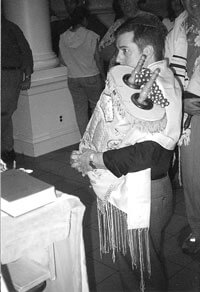VOLUME 3, ISSUE 345 | November 4 – November11, 2004
A Torah Goes Home
Gay Jewish man finds a home in Germany for the Scriptures his grandfather left him
In a way, Rick Landman’s Torah is going home. Next month, the 200-year-old Torah is returning to Germany, from where Landman’s grandfather took it after fleeing the Nazis. Landman, a Tribeca resident, will present the Torah to representatives of the German synagogue Congregation Beth Shalom at Congregation Beth Simchat Torah, the gay, lesbian, bisexual and transgendered (LGBT) synagogue on Bethune Street in the West Village, on November 9.
His grandfather, Martin Oettinger, brought the Torah from Germany in 1946. That side of the family traces its German roots to the 1500s. Martin and his brother Albert even fought in World War I on the side of the Kaiser.
Living in Germany, Martin, an outspoken Jew, had an altercation with the notorious Nazi Julius Streicher in the late 1920s. Streicher was one of the Nazis to be hanged after the Nuremberg trials for his propaganda work and virulent anti-Semitism.
Fearing for his life, Martin fled to France within days of Hitler coming to power in 1933. Martin, Elsie and their young daughter Lisa, Landman’s mother, lived in Strasbourg for six years until they saw what was happening across the river in Germany on Kristallnacht. Seeing burning synagogues convinced them that France would not be able to protect them any longer. So they applied for “Stateless Passports” and left France for America.
The Oettingers eventually immigrated to Washington Heights in February 1939. It was Martin who, as soon as World War II ended, booked a ship to return to the land of his birth to find out what happened to his family, friends and business. On his return home to New York City in 1946, he brought back three Torahs. One he gave to his synagogue in Washington Heights (Congregation Beth Hillel) and the other two he eventually gave to his grandsons, Landman and his brother.
Nearly 60 years later, Landman is donating his Torah to a German reform synagogue on the 66th anniversary of Kristallnacht in 1938, the “Night of the Broken Glass,” when Nazis rampaged in Jewish neighborhoods and burned synagogues.
“Now that there is a Reform, egalitarian synagogue in Munich, the city from where my father’s grandparents were deported to their death in Auschwitz, this is the ideal place for the Torah to go,” Landman said. “It will be in honor of Gerson and Sofie Landman of Munich, who were killed during the Holocaust, and Martin and Elsie Oettinger, my maternal grandparents, who brought the Torah to America. They all would be surprised to know that Jews were once again thriving in Germany.”
Landman, who heads New York University’s real estate department, said that he turned down an earlier opportunity to donate the Torah because of mixed feelings he has over his identity of being both Jewish and gay.
“In 1965, after being told in Hebrew School that no two men would ever be married in front of a Torah, I decided not to donate the Torah at my Bar Mitzvah; but instead I loaned it until I could find a synagogue that would permit gay marriages,” he said. “Finally, in 1973 Congregation Beth Simchat Torah was formed and later when I became an active member, I lent the Torah to them.”
Landman has been a lifelong gay activist—having come out as a teenager and helped organize the first gay rights march on Albany in 1971—and has been a leader at Beth Simchat Torah for more than 25 years. It was at CBST in 1979 that he was elected as the New York representative to the first gay rights march on Washington in 1979.
Landman said that donating the Torah has a special meaning because he is gay.
“When I read ‘Mein Kampf’ in school, I understood how scared my parents must have felt to be Jewish,” he said. “Then as a gay teenager, when I learned there were religious people who took the Bible literally, I was also scared. Both books contained passages that wanted me dead; ‘Mein Kampf’ for being a Jew and the Bible for being gay.”


































